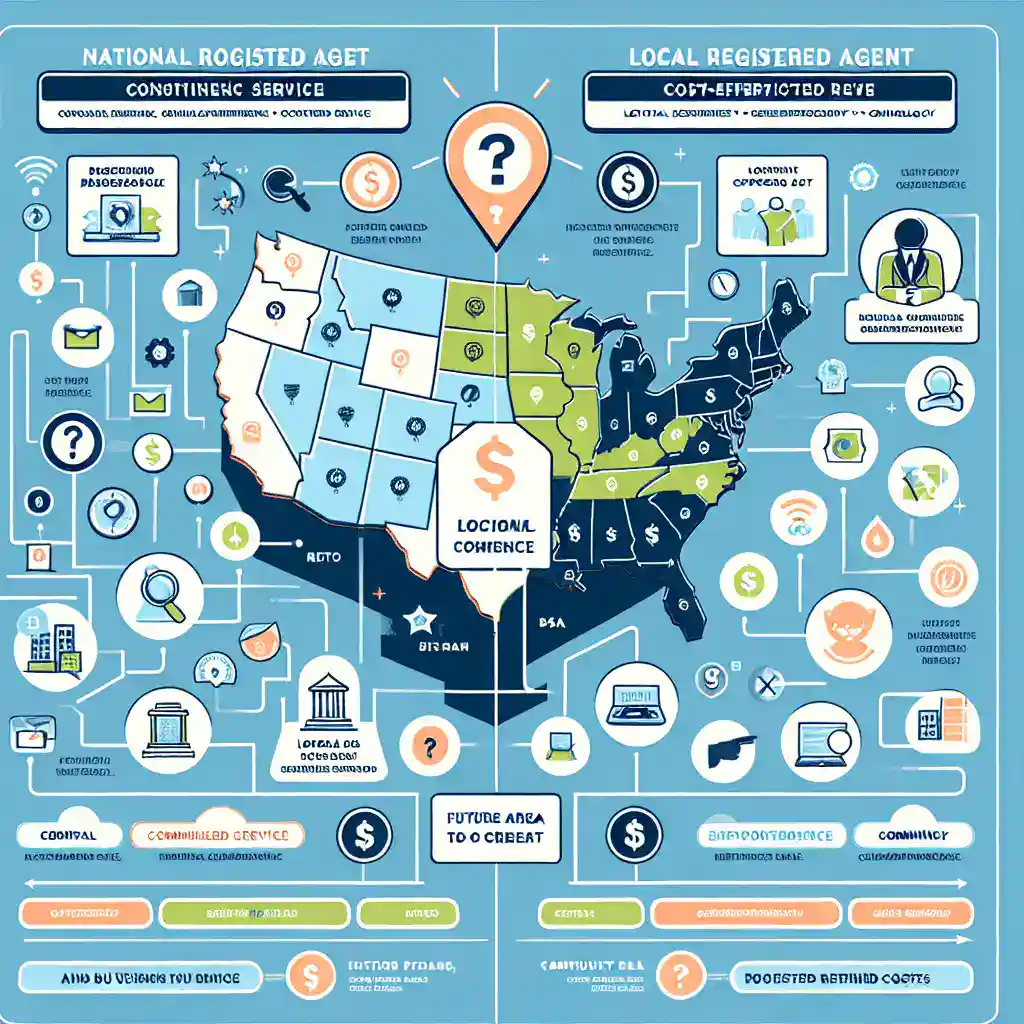Choosing Between a National and Local Registered Agent
Choosing the right registered representative for your business is crucial. A registered agent helps you follow state laws. They receive legal documents for your business. But should you go with a national or local registered agent? This guide will help you understand the service comparison between national and local registered agents and make an informed decision.

What is a Registered Agent?
A registered agent is a person or company. They receive legal papers for your business. These documents include tax notices, lawsuit papers, and other official government notifications. Every business needs a registered agent to remain in good standing with the state.
Why You Need a Legal Representative
Having a registered representative is not just a good idea; it’s the law. Every state requires businesses to have one. The registered agent makes sure you get important papers. Missing these papers could harm your business. Without one, you could face fines or even lose your business status.
National Registered Agents
What Are National Registered Agents?
National registered agents provide services in multiple states. They have offices across the country and can handle your needs no matter where you do business.
Pros of National Registered Agents
- Consistency: They offer the same service across all states. This is helpful if you do business in multiple states.
- Convenience: You have a single point of contact for all your registered agent needs. This makes it easier to manage.
- Experience: National agents usually have a lot of experience. They handle many clients and know the ins and outs of the laws in different states.
- Technology: They use advanced tools and systems to keep track of your documents. This helps ensure you never miss an important notice.
Cons of National Registered Agents
- Cost: They tend to be more expensive than local agents. You pay for the convenience and the wide reach.
- Personalization: With so many clients, the service might feel less personal. They may not understand the specific needs of your local area.
Local Registered Agents
What Are Local Registered Agents?
Local registered agents focus on a specific state or region. They know the local laws and regulations very well.
Pros of Local Registered Agents
- Personalized Service: They offer more tailored service. They are smaller and can give more attention to each client.
- Local Expertise: They have a deep understanding of local laws. This can be very helpful for businesses that operate only in one state.
- Cost-Effective: Local agents are usually cheaper than national agents. This can be a big advantage for small businesses.
- Community Connection: They are often well-connected in the local business community. This can provide additional support and resources.
Cons of Local Registered Agents
- Limited Reach: They only operate in specific states or regions. If you plan to expand, you might need multiple agents.
- Scalability: They might not be able to handle the needs of a growing business that expands into multiple states.
Key Considerations When Choosing a Registered Agent
Business Size and Scope
Consider whether your business is local, regional, or national. If you operate in multiple states, a national agent might be more convenient. If you are focused on one state, a local agent could provide more personalized service.
Budget
Compare the costs of national and local registered agents. Think about what your business can afford. Remember, the cheapest option is not always the best. Consider the value of the services you are getting.
Service Needs
What level of service does your business require? Do you need a lot of support or just the basics? National agents offer more services. Local agents give a personal touch.
Future Plans
Think about your business’s growth plans. If you plan to expand to multiple states, a national agent might be a better choice. If you plan to stay local, a local agent will be sufficient.
Compliance
Make sure the agent you choose can meet all legal and compliance requirements. This is critical to keeping your business in good standing.
Case Studies and Examples
National Registered Agent Example
Let’s say you own a tech startup that’s growing quickly. You have offices in several states. A national agent like Rapid Registered Agent gives consistent service. They cover all your locations. They use advanced technology to track your documents. This ensures you don’t miss important notices. Their experience and reach make them a good choice for your expanding business.
Local Registered Agent Example
Imagine you run a family-owned restaurant in one state. You don’t plan to expand to other states. A local registered representative would be perfect for you. They know the local laws and can provide personalized service. They are also more affordable, which helps you save money. Their connection to the local business community can offer additional support and resources.
Comparing National vs Local Registered Agents for Your Business
Choosing between a national and local registered agent depends on your business needs. National agents offer consistency and convenience. They use advanced technology. However, they cost more and provide less personal service. Local agents offer personalized service and local expertise. They are more affordable but have limited reach and scalability.
Think about your business size, budget, service needs, plans, and compliance requirements. This will help you make the best choice for your business. Look at your business needs. Decide if a national or local registered agent is best for you. Don’t wait until you miss an important document—choose the right registered agent today.
